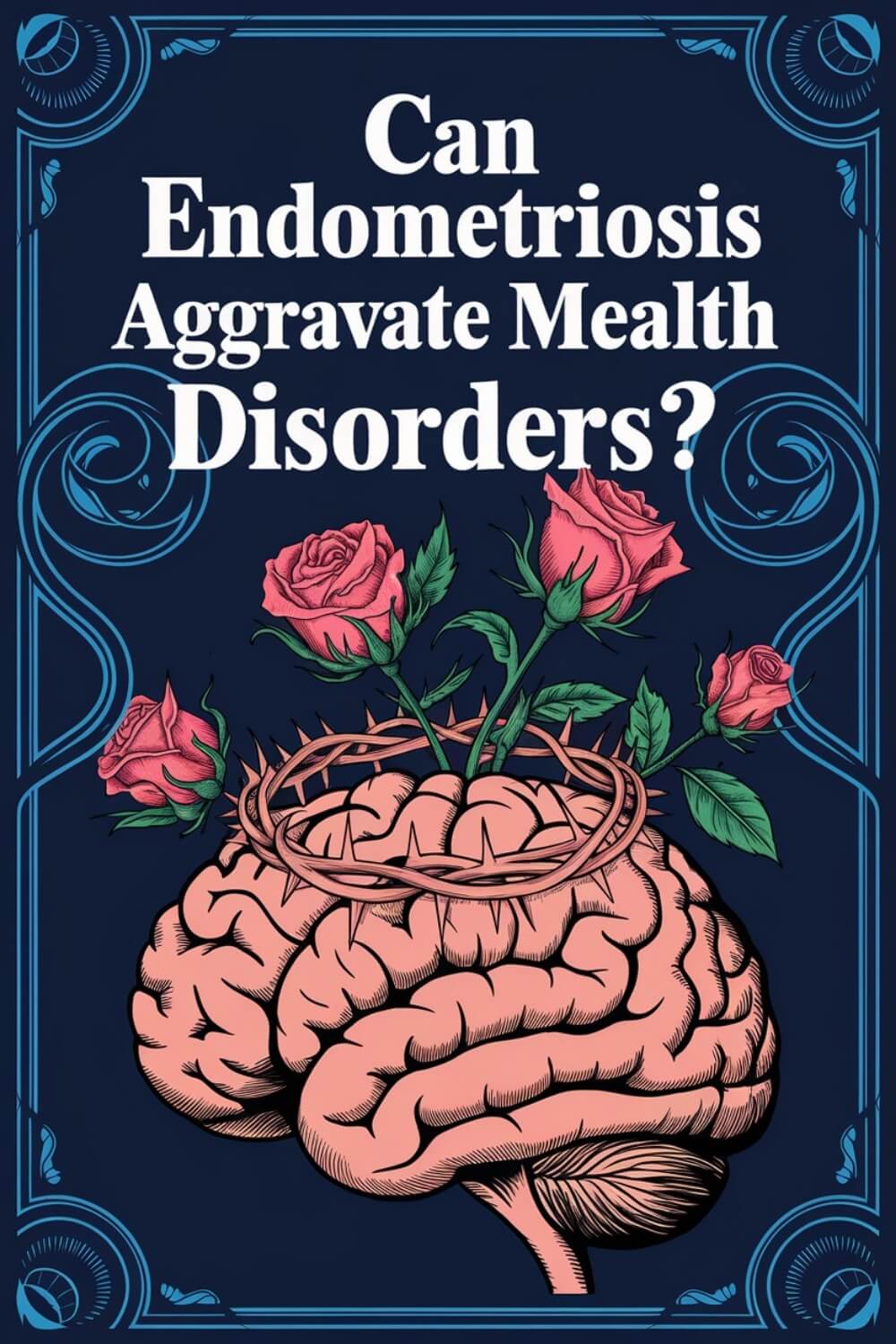Can Endometriosis Aggravate Mental Health Disorders?
As a husband of a woman with two chronic conditions, I’ve seen how endometriosis affects mental health. My wife was diagnosed with stage 4 endometriosis. Later, she got fibromyalgia. I’ve learned to handle her mood swings, anxiety, and depression. But, can endometriosis aggravate mental health disorders?
Endometriosis is more than a gynecological issue. It affects a woman’s overall health, including her mind.
Endometriosis is common, affecting about 10% of women. For those with fertility issues, it’s even higher. Women with endometriosis often face symptoms again, sometimes within a few years.
This condition can really hurt a woman’s mental and emotional health. It raises the risk of depression, anxiety, and stress disorders.
- Understanding Endometriosis: A Systemic Disease Beyond Gynecology
- The Prevalence of Mental Health Disorders in Endometriosis Patients
- The Complex Interplay Between Endometriosis and Mental Health
- Endometriosis mental health disorders: The Genetic Connection
- Challenging the Stigma: Overcoming Misconceptions and Misunderstandings
- The Importance of Early Diagnosis and Interdisciplinary Treatment
- Racial and Ethnic Disparities in Endometriosis Diagnosis and Care
- Coping Strategies and Support Resources for Women with Endometriosis
- The Role of Partners and Loved Ones in Supporting Mental Well-being
- Hormone Imbalances and Their Impact on Mood and Emotions
- Endometriosis and the Risk of Suicidal Thoughts and Behaviors
- Advocating for Yourself: Communicating with Healthcare Providers
- Integrative Approaches: Mind-Body Therapies and Lifestyle Modifications
- Ongoing Research and Emerging Treatments for Endometriosis
- Source Links for Can Endometriosis Aggravate Mental Health Disorders
Understanding Endometriosis: A Systemic Disease Beyond Gynecology
Endometriosis is a complex condition that goes beyond gynecology. It affects the whole body, causing a variety of symptoms. These symptoms are not just limited to the reproductive system
If you want to learn more about endometriosis, I wrote an “Endo-Tool, Endometriosis for Men” e-Book.
You can get the 1st Chapter of the e-Book for FREE, and if you like it, you’ll get a Whopping 33% Discount on the Whole Book, plus discounts on other helpful tools. You have nothing to lose but a lot to gain!
The first chapter alone contains all the comprehensive medical knowledge about endometriosis, including:
- What is endometriosis?
- What are the symptoms?
- What causes endometriosis?
- What does endometriosis look like?
- What are the stages?
- What are the types?
- What is adenomyosis and how is it related to endometriosis?
- Why do some women develop severe endo and others don’t?
- Does endometriosis cause infertility?
- How is endometriosis diagnosed?
- Do types and stages affect the treatment?
- Recurrence of endometriosis after excision surgery.
FREE Chapter of “Endo-Tool”
Endometriosis e-Book for Men
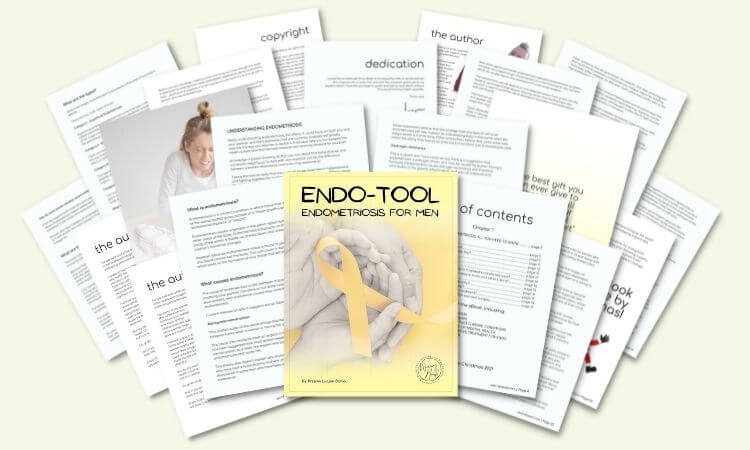
Endometriosis: More Than Just a Gynecological Condition
Endometriosis is not just a “women’s issue.” It can occur in different parts of the body. This includes the ovaries, fallopian tubes, bladder, intestines, and even the diaphragm. This widespread presence makes it hard to diagnose and manage.
Chronic Pain and Wide-Ranging Symptoms
Chronic pain is a key symptom of endometriosis. This pain can be in the pelvic, abdominal, or low back area. It can also make sexual intercourse, urination, and bowel movements painful. People with endometriosis may also experience heavy bleeding, fatigue, bloating, nausea, and infertility.
Endometriosis is more than a gynecological issue. It’s a systemic disease that affects mental and physical health. Understanding its true nature is key to providing effective care.
As we learn more about endometriosis, it’s clear it’s not just a “women’s issue.” It’s a complex, systemic disease. It can deeply impact a person’s health and well-being.

The Prevalence of Mental Health Disorders in Endometriosis Patients
Endometriosis affects about 10% of women of childbearing age. It’s linked to mental health issues like depression, anxiety, and eating disorders. Studies show women with endometriosis face higher risks of these problems than those without it.
The Relationship Between Endometriosis and Depression, Anxiety, and Eating Disorders
Endometriosis and mental health issues are closely connected. The pain, infertility, and symptoms of endometriosis can greatly affect a woman’s life. This can lead to mood disorders like depression and anxiety.
Research shows endometriosis patients face higher rates of depression, anxiety, and eating disorders. A study found 86.5% of women with pelvic endometriosis had depression, and 87.5% had anxiety. Also, 67% of endometriosis patients were diagnosed with a mental health issue, compared to 51.2% without it.
Healthcare providers need to treat the mental health aspects of endometriosis. This is key to a complete treatment plan.
| Mental Health Condition | Prevalence in Endometriosis Patients | Prevalence in General Population |
|---|---|---|
| Depression | 86.5% | No data available |
| Anxiety | 87.5% | No data available |
| Eating Disorders | No data available | No data available |

The Complex Interplay Between Endometriosis and Mental Health
As a caring husband, I’ve seen how endometriosis affects mental wellbeing. My wife, Sarah, was diagnosed with stage 4 endometriosis and later fibromyalgia. This condition impacts about 10% of American women. Women with endometriosis are twice as likely to have depression or anxiety.
Sarah’s journey has been tough. She deals with physical pain, emotional struggles, and challenges to her quality of life. The chronic pain and fear of infertility have caused frustration, anxiety, and depression. I’ve learned to support her through mood swings, obsessive thoughts, and suicidal thoughts. It’s been tough, but I’m committed to helping her through this.
Chronic Pain, Infertility, and the Impact on Quality of Life
The pain from endometriosis is often severe, making simple tasks hard. This pain can lead to stress, anxiety, and depression. The fear of infertility adds to the emotional burden and sense of loss.
Researchers are studying the link between physical and mental health in endometriosis. It’s important to address mental health needs for full care. With the right support, women like Sarah can manage their condition and improve their quality of life.
Endometriosis mental health disorders: The Genetic Connection
As a husband supporting my wife with stage 4 endometriosis, I’ve seen its big impact on mental health. Studies have found a link between endometriosis and mental health issues. This shows how deeply these conditions are connected.
My wife was first diagnosed with endometriosis, then with fibromyalgia a year later. This led to mood swings, frustration, anxiety, depression, OCD, and even suicidal thoughts. As her partner, I’ve had to adapt and support her through this.
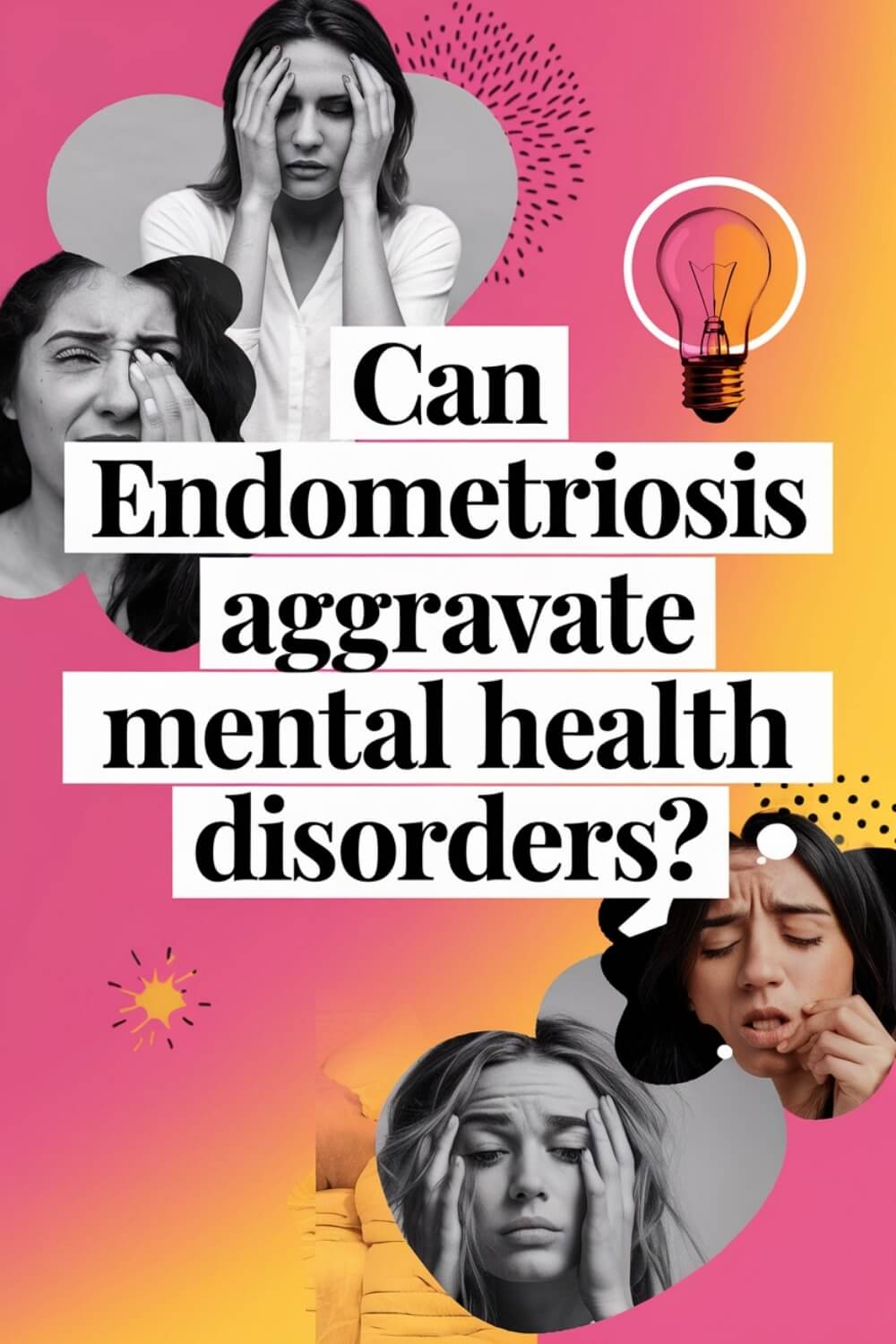
Shared Genetic Variants: Insights into the Biological Basis
Researchers have found common genetic traits in endometriosis and mental health issues like depression and anxiety. A study with over 8,000 women with endometriosis found links to depression (3.61 times), eating disorders (2.94 times), and anxiety (2.61 times).
Another study showed that genes linked to depression and anxiety also increase the risk of endometriosis. This shows that the connection between endometriosis and mental health is more than just physical symptoms.
Knowing the genetic roots of this connection is key to better treatments. It’s about improving the overall well-being of those with endometriosis mental health disorders.
Challenging the Stigma: Overcoming Misconceptions and Misunderstandings
As the husband of a woman with stage 4 endometriosis, I’ve seen its harsh effects. My wife’s diagnosis led to fibromyalgia, causing mood swings, frustration, and depression. She even thought about harming herself.
For too long, endometriosis has been misunderstood. Women’s symptoms are often ignored or seen as mental issues. This stigma affects how patients are treated. Endometriosis affects 176 million people, making it a major cause of chronic pain.
As a caregiver, I’ve learned to support my wife through her struggles. It’s key to fight these misconceptions and raise awareness. By doing so, women with endometriosis can get the care they need.
- Endometriosis is more than just a reproductive issue.
- Its chronic pain and symptoms can harm mental health, leading to depression and anxiety.
- The connection between endometriosis and mental health is being studied, but it’s clear.
By exposing these misconceptions, we can create a better environment for those with endometriosis. Together, we can challenge the stigma and ensure women with endometriosis get the care they deserve.
| Statistic | Value |
|---|---|
| Estimated number of individuals affected by endometriosis worldwide | 176 million |
| Approximate percentage of women worldwide affected by endometriosis | 10% |
| Percentage of individuals with endometriosis who eventually undergo hysterectomy | 12% |
| Probability of persistent pain after hysterectomy for endometriosis | 15% |
| Risk of worsening pain or new symptom development post-hysterectomy | 3-5% |
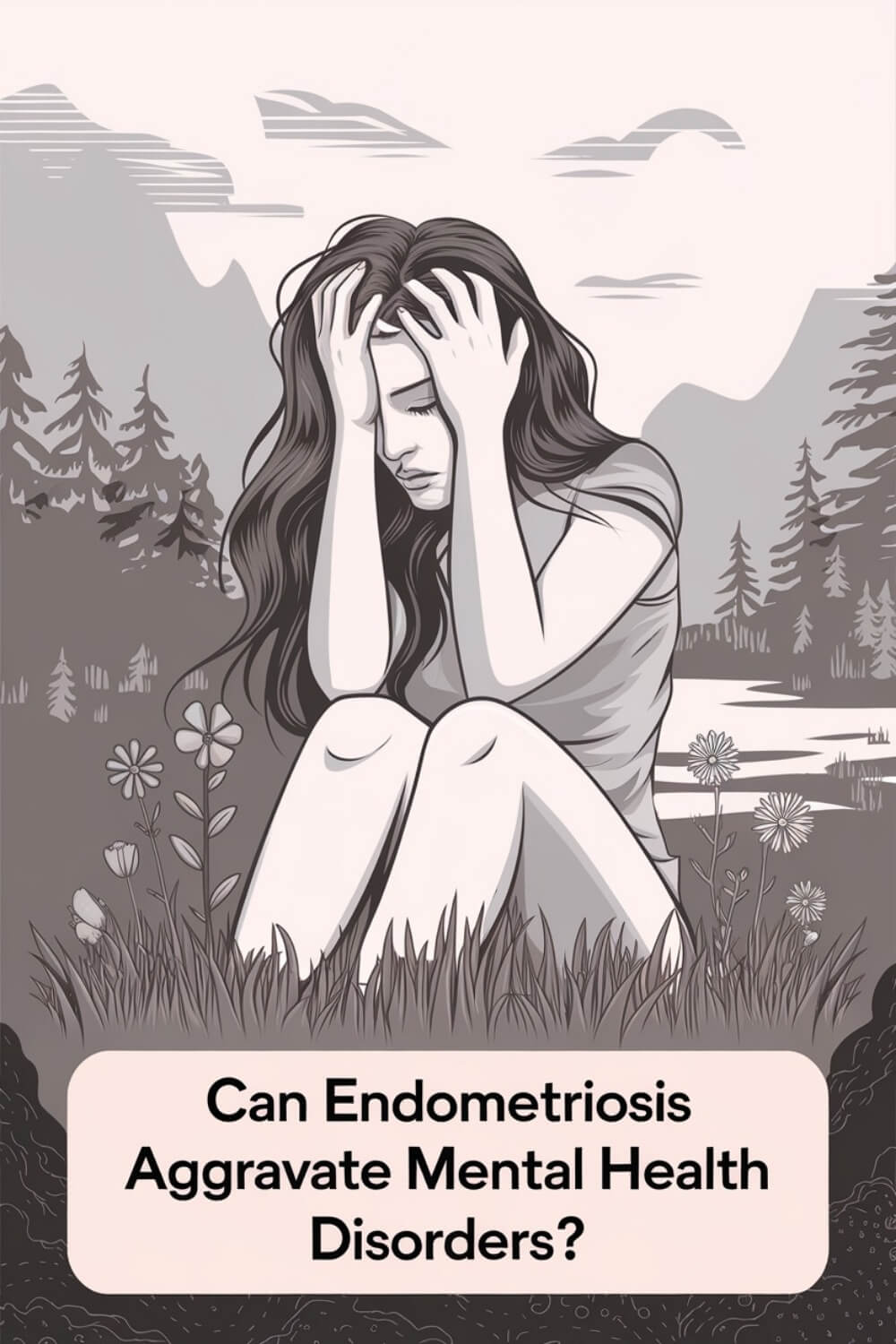
The Importance of Early Diagnosis and Interdisciplinary Treatment
As the spouse of a woman with stage 4 endometriosis, I’ve seen its big impact on mental health. My wife’s journey started with a late diagnosis, followed by fibromyalgia a year later. Dealing with her mood swings, frustration, anxiety, depression, OCD, and suicidal thoughts has been tough but necessary.
Addressing Pain Management and Mental Health Support
Early diagnosis and a team-based treatment plan are key for women with endometriosis. Delayed diagnosis can make suffering worse and hurt both physical and mental health. A treatment plan that covers endometriosis pain management and mental health support is vital for better health.
As a caring partner, I’ve learned to support my wife through tough times. Endometriosis mental health disorders can be tough, but with the right care, there’s hope. Early action and teamwork between doctors, mental health experts, and patients are essential for managing endometriosis and mental health.
By pushing for endometriosis early diagnosis and endometriosis mental health support, we can help women get the care they need. Together, we can fight stigma, debunk myths, and help those affected to take back their mental and physical health.
Racial and Ethnic Disparities in Endometriosis Diagnosis and Care
As a husband, I’ve seen the tough times my wife has with stage 4 endometriosis. I’ve learned about the big differences in how it’s diagnosed and treated in different races and ethnicities. My wife also got fibromyalgia a year after her endometriosis diagnosis, making things even harder for her.
Research shows that Black and Hispanic women are less likely to be diagnosed with endometriosis than white women. Asian women, on the other hand, are more likely to get a diagnosis. These differences can cause delays in treatment and make the physical and mental health problems worse for women of color with endometriosis.
Experts say these differences come from many places. Implicit biases in healthcare can lead doctors to make assumptions about pain and symptoms based on a patient’s race or ethnicity. Also, endometriosis has often been seen as a problem of white, upper-class women. This has made it harder for women from other backgrounds to get diagnosed and treated.
To fix these problems, we need to teach healthcare providers about their own biases. We also need to make sure they know how endometriosis affects different ethnic groups. This education is key to better diagnosis and care.
We must keep fighting for better understanding and treatment of endometriosis. It’s important to tackle the big barriers and unfairness that stop women of color from getting good care. By making healthcare more inclusive and fair, we can help everyone with endometriosis get the support they need to feel better.
| Racial Group | Endometriosis Diagnosis Likelihood |
|---|---|
| White Women | Average |
| Black Women | Less Likely |
| Hispanic Women | Less Likely |
| Asian Women | More Likely |
Coping Strategies and Support Resources for Women with Endometriosis
As a husband, I’ve seen my wife’s strength in fighting stage 4 endometriosis. She also has fibromyalgia, making life harder. We’ve learned to cope and find support together.
Building a Strong Support Network
Managing endometriosis and its mental health effects starts with a strong support network. My wife joined endometriosis support groups online. It’s helped her feel less alone.
She also values in-person groups and friends who understand. Telling our loved ones about endometriosis has helped them support us better. This support has been key in facing the condition’s challenges.
Seeking Professional Help for Mental Health Concerns
Getting professional help for mental health is also vital. My wife deals with depression, anxiety, OCD, and suicidal thoughts due to endometriosis. Mental health professionals have been a big help.
Therapies and medications have helped my wife cope. I’ve learned to support her mental health as much as her physical health.
Dealing with endometriosis and its mental health effects has taught me a lot. Building a strong support network and seeking professional help has helped us manage. I hope our story encourages others to prioritize their mental health and seek the support they need.
The Role of Partners and Loved Ones in Supporting Mental Well-being
As a husband, I’ve learned a lot about the emotional side of endometriosis. My wife has stage 4 endometriosis and also fibromyalgia. These conditions have made her mental health a big challenge, causing mood swings, anxiety, and depression.
Supporting my wife has shown me how important partners and loved ones are. With empathy and patience, we can help those with endometriosis a lot.
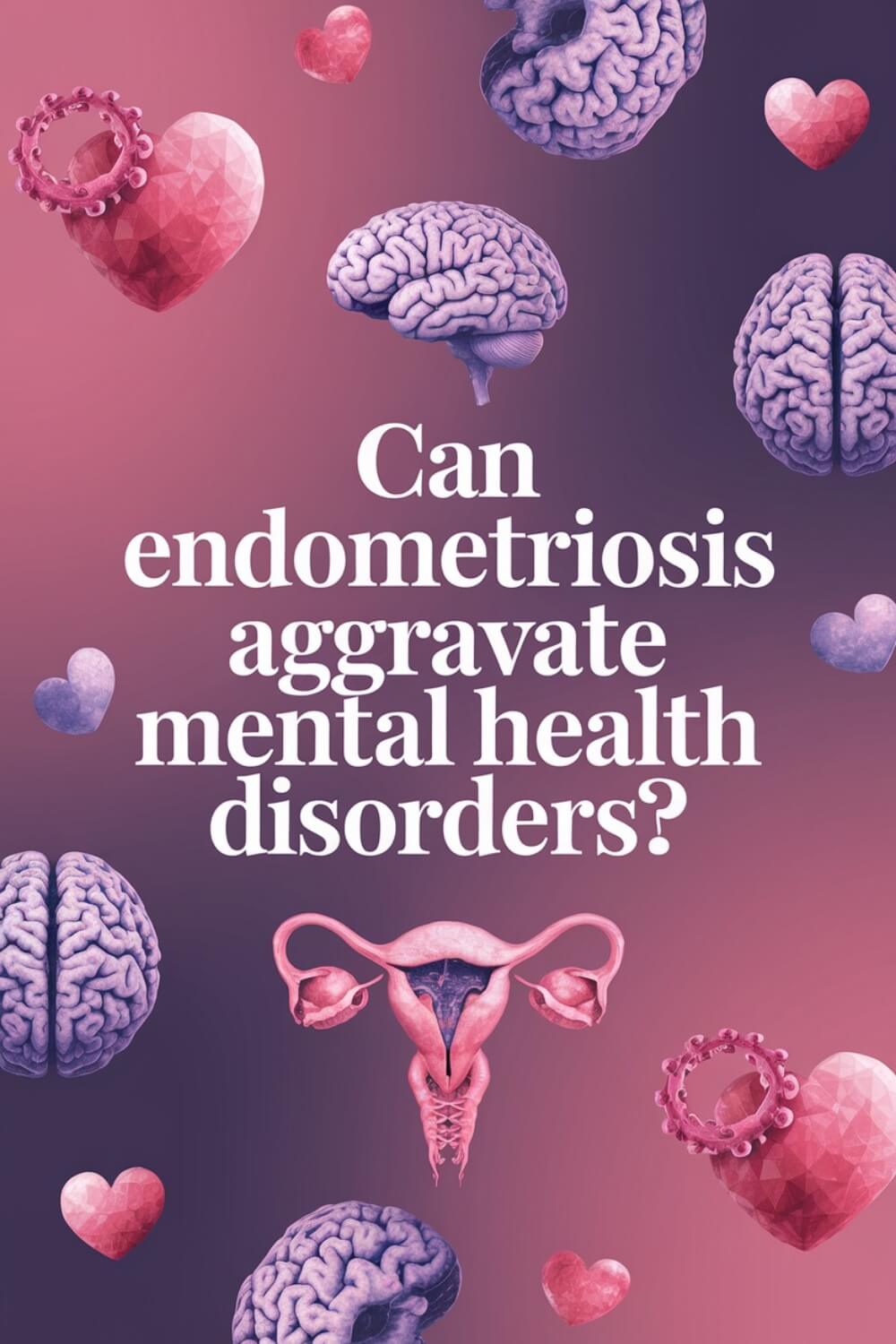
Validating the Experience
Validating my wife’s experiences is key. Endometriosis affects people in many ways, both physically and emotionally. By listening and understanding her pain, I help her feel heard and valued.
Providing Practical Assistance
Helping out in practical ways also helps a lot. This can be doing chores, driving her to doctor’s appointments, or just being there to listen. It’s all about making her life easier.
Encouraging Self-Care
Endometriosis can be very tiring. I try to encourage my wife to take care of herself. This means doing things she enjoys, getting mental health help, or just resting when she needs to.
By being there for her, we can help her stay mentally strong. As her journey with endometriosis goes on, I’m proud to support her. It’s a big responsibility, but it’s worth it to see her thrive.
Hormone Imbalances and Their Impact on Mood and Emotions
My wife’s stage 4 endometriosis diagnosis has shown me how hormonal imbalances affect mental health. She also has fibromyalgia, which has made managing her mood and emotions a challenge. I’ve learned to support her through her struggles with anxiety, depression, OCD, and even suicidal thoughts.
Endometriosis often leads to hormonal imbalances, like high estrogen levels. These changes can make a woman feel angry, irritable, and moody. It’s important to understand how endometriosis, hormone levels, and mental health are connected. This knowledge helps in finding treatments that work for both the body and mind.
Depression and anxiety are more common during estrogen-producing years. Up to 90% of women experience symptoms before their periods. Premenstrual syndrome (PMS) affects 20%-40% of women, with 3%-9% experiencing severe PMDD.
Hormones like estrogen, testosterone, and progesterone control neurotransmitters. These neurotransmitters affect our emotions and mood. Changing our lifestyle, using medications, and trying therapies can help manage endometriosis-related mental health issues.
Dealing with endometriosis and its effects requires a holistic approach. We must focus on both physical and mental health. By understanding the link between hormones, endometriosis, and mental health, we can help those affected improve their lives.
| Condition | Prevalence |
|---|---|
| Premenstrual Syndrome (PMS) | 20%-40% of women |
| Premenstrual Dysphoric Disorder (PMDD) | 3%-9% of women |
| Postpartum Depression | 10%-25% of women within 6 months after childbirth |
| Perimenopausal Depression | Up to 10% of women |

Endometriosis and the Risk of Suicidal Thoughts and Behaviors
As a husband, I’ve seen how endometriosis affects mental health. My wife, Sarah, has been fighting stage 4 endometriosis for years. She also got fibromyalgia a year later. I’ve learned to support her through mood swings, anxiety, and even suicidal thoughts.
Studies show women with endometriosis face a higher risk of suicidal thoughts. The pain and emotional stress can make mental health worse. This leaves some women feeling hopeless.
We must help endometriosis patients get the mental health support they need. As a caregiver, I’ve learned to build a strong support network. I advocate for my wife and encourage her to seek professional help.
One study found 20.26% of endometriosis patients developed mental disorders. This is compared to 11.44% in the control group. Women over 40 with endometriosis face an even higher risk.
Raising awareness and breaking down stigma is key. We can help women like Sarah get the care they need. It’s time to focus on their overall well-being.
With medical treatment, therapy, and self-care, we can help endometriosis patients. They can manage their condition and improve their quality of life. It’s a journey, but with support, they can overcome challenges.
Advocating for Yourself: Communicating with Healthcare Providers
As a husband, I’ve seen how important self-advocacy is for my wife with stage 4 endometriosis and fibromyalgia. Managing endometriosis affects both body and mind. It’s key to speak up for the care you need.
Keeping notes during doctor visits is a big help. It’s a way to remember important details. This is even more important when dealing with the fog from chronic pain and mental health issues.
With COVID-19, using telehealth like FaceTime or Zoom is helpful. It lets loved ones join in when they can’t be there in person. Also, many doctors’ offices have online portals for patients to ask questions and stay in touch.
Talking openly about sensitive topics is vital. This includes bathroom habits, sex life, and wanting children. Being honest helps doctors understand your situation better. This leads to better care and treatment plans.
Using planners, to-do lists, and phone calendars helps manage endometriosis. It keeps track of appointments, work, and family duties.
Online groups like Facebook, Twitter, and Instagram offer support. But, always check advice online with your doctor. Make sure it matches what your healthcare team says.
Being your own advocate is a strong way to get the help you need. By talking openly with doctors, you can take charge of your care. This improves your physical and mental health.
Integrative Approaches: Mind-Body Therapies and Lifestyle Modifications
My wife has been fighting stage 4 endometriosis for years. I’ve seen how important a holistic approach is. Mind-body therapies and lifestyle changes help manage the physical and mental challenges of endometriosis.

Mindfulness, Yoga, and Stress Management Techniques
Mindfulness, yoga, and stress management are key. They help with chronic pain, anxiety, and depression. Mindfulness helps cope with symptoms and emotions. Yoga reduces pain and improves life quality. Stress management techniques like deep breathing and muscle relaxation are also helpful.
Adding these therapies to treatment plans empowers women with endometriosis. It helps manage both physical and mental health. This leads to a more effective way to manage the condition.
Lifestyle changes like a healthy diet, exercise, and stress reduction are also important. These choices support our overall health. They help lessen the impact of endometriosis and improve our lives.
Dealing with endometriosis requires an open and integrative approach. Combining medical treatments with mind-body therapies and lifestyle changes helps women regain control. It supports them in finding the support they need to thrive.
Ongoing Research and Emerging Treatments for Endometriosis
To finish off, I hope I demonstrated how endometriosis can aggravate mental health disorders. As my wife’s husband, I’ve seen how endometriosis affects mental health. Her stage 4 deep infiltrating endometriosis diagnosis and later fibromyalgia brought mood swings, frustration, and anxiety.
It’s been tough, but I’ve learned to support her through it.
Scientists are making big strides in understanding endometriosis and mental health. They’re looking into how genetics link both conditions. This could lead to better treatments.
New research aims to find non-invasive ways to diagnose endometriosis. This could help avoid long waits for a diagnosis. Scientists are also exploring new therapies, like peptide medications. These could target endometriosis without harming healthy tissues.
If you have anything in mind to add on how endometriosis can aggravate mental health disorders, do share in the comments section below. Thanks so much!


About Me
Hi, I’m Lucjan! The reason why I decided to create this blog was my beautiful wife, who experienced a lot of pain in life, but also the lack of information about endometriosis and fibromyalgia for men…
Source Links for Can Endometriosis Aggravate Mental Health Disorders
- https://www.dovepress.com/association-between-endometriosis-and-mental-disorders-including-psych-peer-reviewed-fulltext-article-IJWH
- https://www.medicalnewstoday.com/articles/endometriosis-and-depression
- https://www.endofound.org/the-importance-of-mental-health-support-while-managing-endometriosis
- https://www.psychiatry.org/news-room/apa-blogs/how-endometriosis-can-impact-mental-health
- https://www.ncbi.nlm.nih.gov/pmc/articles/PMC10465859/
- https://www.frontiersin.org/journals/psychology/articles/10.3389/fpsyg.2022.935349/full
- https://www.ncbi.nlm.nih.gov/pmc/articles/PMC5440042/
- https://www.contemporaryobgyn.net/view/endometriosis-linked-to-higher-risk-of-mental-health-conditions
- https://www.drdanielkushner.com/blog/how-does-endometriosis-impact-mental-health
- https://www.texaschildrens.org/content/wellness/endometriosis-and-mental-health
- https://icarebetter.com/unraveling-the-links-between-endometriosis-and-mental-health/
- https://www.ncbi.nlm.nih.gov/pmc/articles/PMC9856929/
- https://www.endonews.com/are-women-with-endometriosis-more-prone-to-have-mental-health-disorders
- https://www.ncbi.nlm.nih.gov/books/NBK565622/
- https://humanfactors.jmir.org/2022/1/e31317/
- https://medicine.yale.edu/news/yale-medicine-magazine/article/endometriosis
- https://www.mdpi.com/2077-0383/12/12/4056
- https://pmc.ncbi.nlm.nih.gov/articles/PMC10120420/
- https://www.ajmc.com/view/racial-disparities-associated-with-endometriosis-diagnosis
- https://www.ncbi.nlm.nih.gov/pmc/articles/PMC9992263/
- https://www.michiganmedicine.org/health-lab/uncovering-drivers-racial-disparities-uterine-fibroids-and-endometriosis
- https://endometriosisassn.org/about-endometriosis/coping-techniques/
- https://endometriosisnetwork.com/endo-hub/mental-health-a-guide-for-people-with-endometriosis/
- https://endometriosistreatmentcenternyc.com/the-psychological-impacts-of-endometriosis-coping-and-support/
- https://www.ncbi.nlm.nih.gov/pmc/articles/PMC9267240/
- https://hqlo.biomedcentral.com/articles/10.1186/s12955-022-01991-1
- https://www.webmd.com/women/estrogen-and-womens-emotions
- https://www.pollie.co/blog/hormones-and-mental-health
- https://www.mariongluckclinic.com/blog/hormones-and-mental-health-whats-the-connection.html
- https://www.ncbi.nlm.nih.gov/pmc/articles/PMC10693200/
- https://www.academia.edu/96001718/Psychological_and_mind_body_interventions_for_endometriosis_A_systematic_review
- https://www.endofound.org/six-effective-ways-to-be-your-own-endo-advocate
- https://endometriosisnetwork.com/endo-hub/communication-tips-for-navigating-endometriosis/
- https://www.ncbi.nlm.nih.gov/pmc/articles/PMC7001750/
- https://icarebetter.com/integrative-therapies-for-endometriosis/
- https://www.ncbi.nlm.nih.gov/pmc/articles/PMC8594049/
- https://pmc.ncbi.nlm.nih.gov/articles/PMC10448566/
- https://www.medicalnewstoday.com/articles/the-latest-in-endometriosis-research-ways-forward
